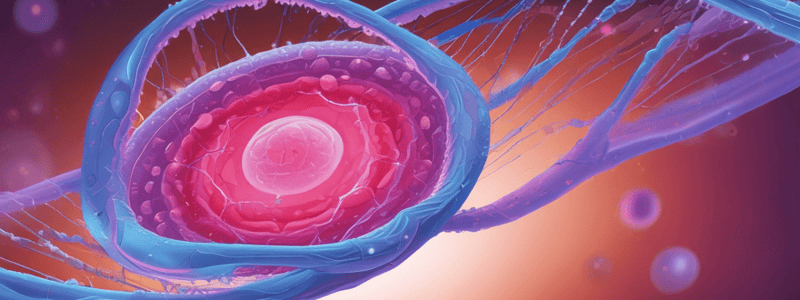Podcast
Questions and Answers
What is the primary function of niche cells in the context of adult stem cells?
What is the primary function of niche cells in the context of adult stem cells?
- To stimulate the differentiation of adult stem cells
- To regulate the expression of pluripotent markers in adult stem cells
- To provide a sheltering environment that sequesters stem cells from differentiation stimuli (correct)
- To induce apoptosis in adult stem cells
What is the characteristic of multipotent stem cells compared to pluripotent stem cells?
What is the characteristic of multipotent stem cells compared to pluripotent stem cells?
- They are more capable of generating all tissue types
- They are only found in adult tissues
- They are more restricted in their ability to generate different tissue types (correct)
- They are only found in embryonic tissues
Where do liver adult stem cells, also known as 'oval cells', reside?
Where do liver adult stem cells, also known as 'oval cells', reside?
- In the canals of Hering (correct)
- In the hepatic sinusoids
- In the bile ducts
- In the hepatic cords
What is the term used to describe adult stem cells that are restricted to generating certain cell types?
What is the term used to describe adult stem cells that are restricted to generating certain cell types?
What is the primary role of adult stem cells in tissue maintenance?
What is the primary role of adult stem cells in tissue maintenance?
What is the primary function of hematopoietic stem cells in bone marrow?
What is the primary function of hematopoietic stem cells in bone marrow?
What is the purpose of inducing differentiation in culture during stem cell therapy?
What is the purpose of inducing differentiation in culture during stem cell therapy?
What is the role of satellite cells in skeletal muscle?
What is the role of satellite cells in skeletal muscle?
What is the purpose of 'therapeutic cloning' in stem cell therapy?
What is the purpose of 'therapeutic cloning' in stem cell therapy?
What is the function of neural stem cells in the brain?
What is the function of neural stem cells in the brain?
What is a characteristic of stem cells that allows them to regenerate cells in self-renewing tissues?
What is a characteristic of stem cells that allows them to regenerate cells in self-renewing tissues?
What is the primary function of growth factors in cell proliferation?
What is the primary function of growth factors in cell proliferation?
Which of the following is a mechanism of cell population regulation?
Which of the following is a mechanism of cell population regulation?
What is the term for the process by which cells achieve an adult cell phenotype?
What is the term for the process by which cells achieve an adult cell phenotype?
What is the result of hepatocyte and matrix damage in the liver?
What is the result of hepatocyte and matrix damage in the liver?
Flashcards are hidden until you start studying
Study Notes
Stem Cells: Therapy
- Therapeutic cloning uses embryonic stem cells, where a diploid nucleus from a patient's skin fibroblast is transferred into an enucleated oocyte, activated to form a zygote, and then harvests embryonic stem cells (ESCs) to induce differentiation in culture.
- iPS cells are used in therapy, where patient's skin fibroblast cells are cultured, transduced with genes encoding transcription factors, and then induced to differentiate in culture.
- Both methods aim to repopulate damaged tissues with cells that avoid immune-mediated rejection.
Stem Cells: Normal Tissue Maintenance
- Hematopoietic stem cells in bone marrow generate all blood cell lineages and are used therapeutically after bone marrow depletion.
- Stem cells in the liver, known as "oval cells", differentiate into both hepatocytes and biliary duct cells, and are recruited only when hepatocyte proliferation is inadequate.
- Neural stem cells in the brain generate neurons, astrocytes, and oligodendrocytes, but it is unclear if new cells integrate into neural circuits.
- Satellite cells in skeletal muscle are a reserve pool of stem cells that replicate and become new myocytes after injury.
Stem Cells: Origins and Types
- Pluripotent stem cells can generate all tissue types.
- Multipotent stem cells are more restricted than embryonic stem cells and eventually become "lineage committed".
- Adult (somatic) stem cells have a restricted capacity to generate certain cell types and are thus "lineage-committed".
Niche Cells
- Niche cells are non-stem cells that provide a sheltering environment for stem cells, sequestering them from differentiation stimuli, apoptotic stimuli, and other challenging stimuli.
- Niche cells contribute to the balance between adult stem cell quiescence and replication.
Mechanisms for Regulation of Cell Populations
- Proliferation increases cell number by replication (hyperplasia).
- Differentiation is the achievement of an adult cell phenotype.
- Apoptosis is programmed cell death.
Stem Cells: Definitions
- Stem cells are normal, undifferentiated cells with self-renewal and the ability to generate differentiated cells.
- Stem cells are critical for regeneration of cells in self-renewing tissues.
- Regenerative medicine involves therapeutic applications of stem cells to repair damaged tissues that do not typically regenerate after injury.
Studying That Suits You
Use AI to generate personalized quizzes and flashcards to suit your learning preferences.


